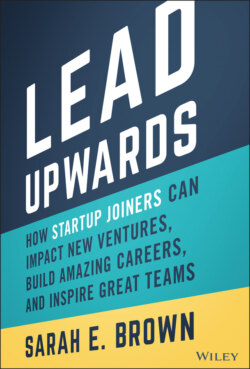Читать книгу Lead Upwards - Sarah E. Brown - Страница 20
WHO'S QUALIFIED TO BE A STARTUP EXECUTIVE?
ОглавлениеThere is no minimum number of degrees nor years of experience required to be a startup executive. You read that correctly: None. There are 24‐year‐old CEOs of startups and there are 24‐year‐old VPs of sales at startups. Some startup executives have MBAs from fancy top‐tier business schools and thirty years of business experience. Others didn't graduate from high school. Some don't become startup leaders until they've got two decades of business under their belts and some are promoted after five or six years of startup experience.
No lack of credentials should keep you from aspiring to become a startup executive. Will a twenty‐six‐year‐old who's been working for four years be better suited to be a successful startup executive than someone with two or three times that amount of experience? It depends, just as it depends for founders. According to Harvard Business Review, the average startup founder is 45, even though stereotypes would have us believe it's much younger.1
Here's another stat from Harvard Business Review that motivated the inception of this book: women tend to only apply for jobs that they're 100% qualified for vs. men will apply when they only meet a selection of the criteria listed.2
Harvard Business School author and leadership coach Anne Morriss says that, based on her and her partner Frances Frei's research, demographics bear no weight on who succeeds in a leadership role.
“Our research shows there aren't major demographic differences in who ends up ‘killing it’ at a startup in a leadership role,” says Morriss.
“Demographics do matter in who gets promoted, who receives the resources, and who has access to the networks,” says Morriss. “But once you make it into a leadership role, the people who thrive are those who bring curiosity to their own strengths and weaknesses and the strengths and weaknesses of the individuals around them.”
